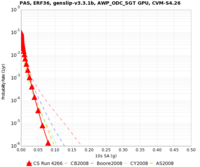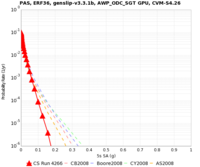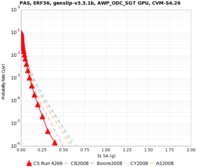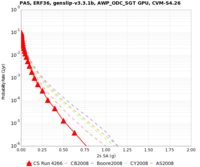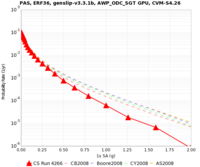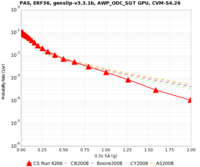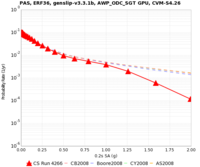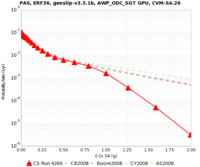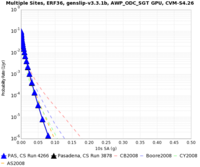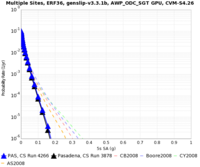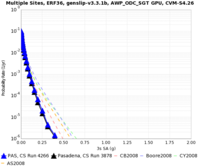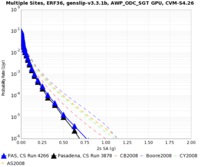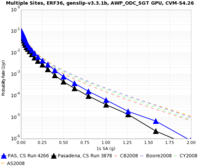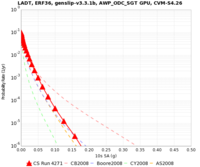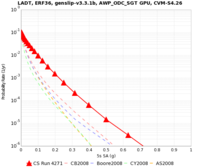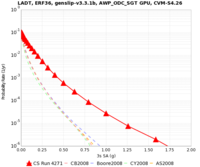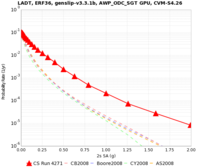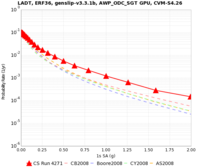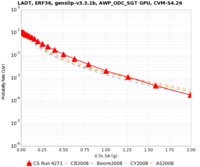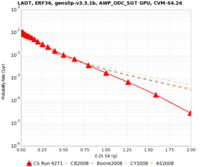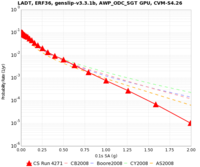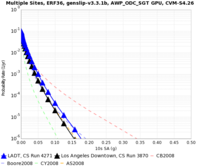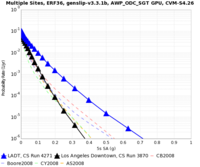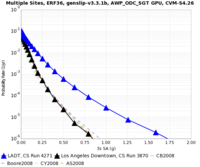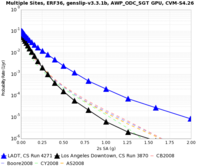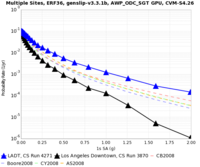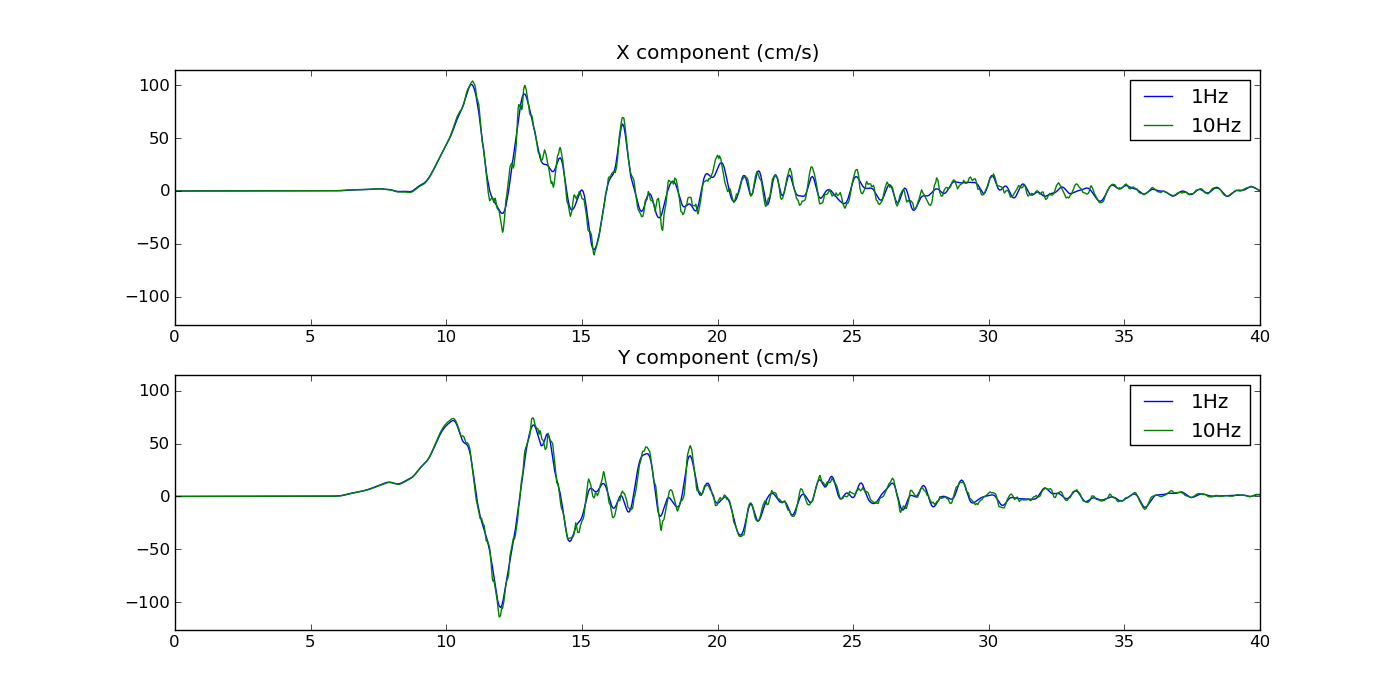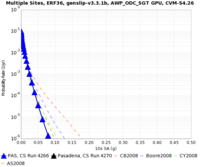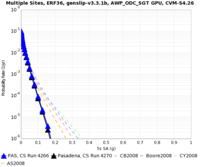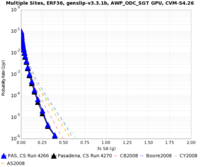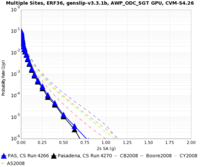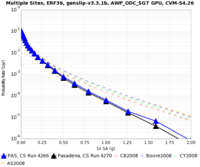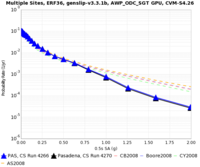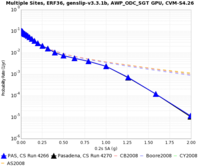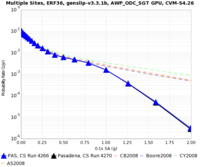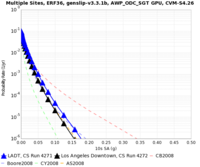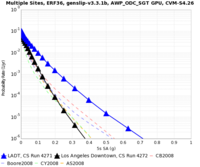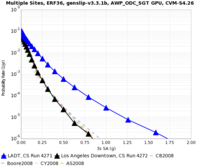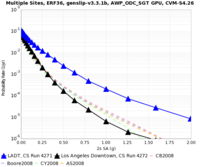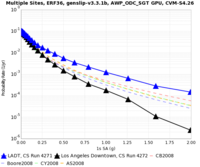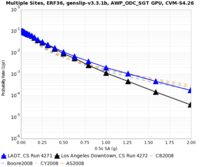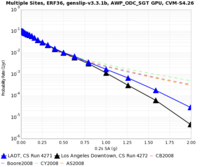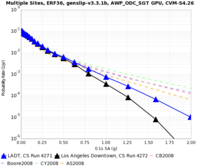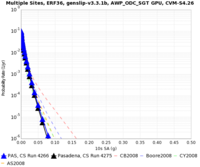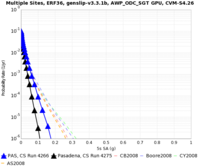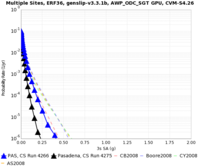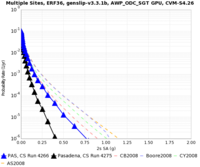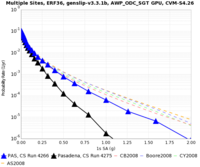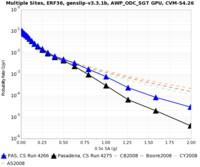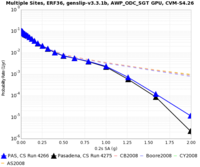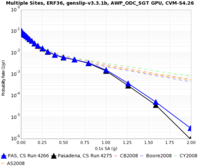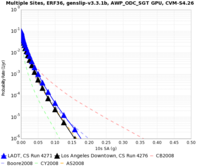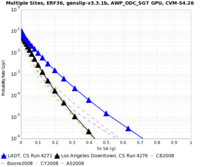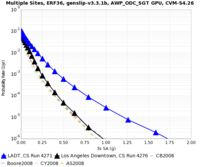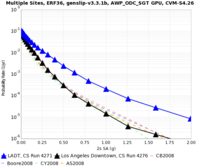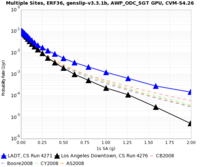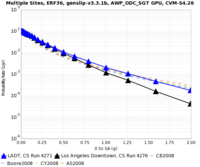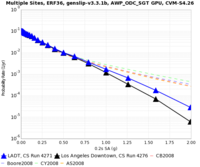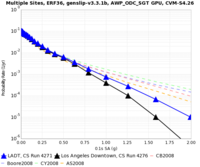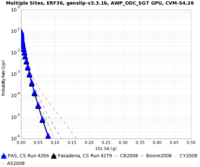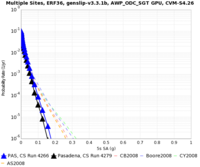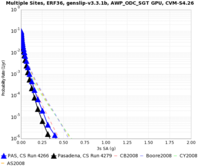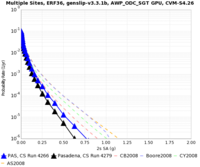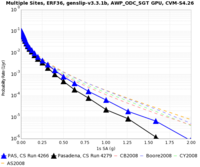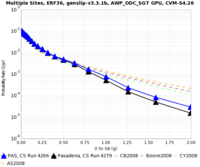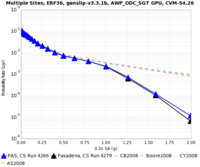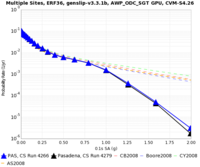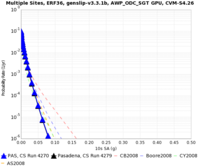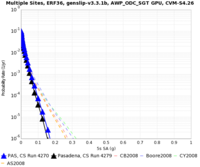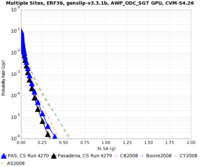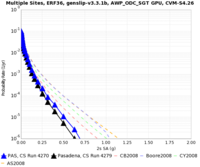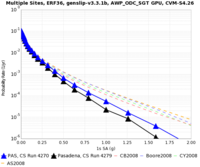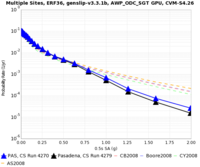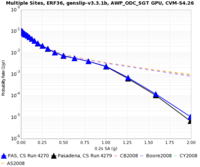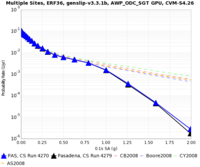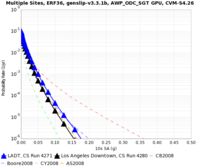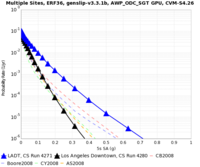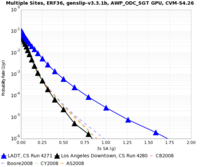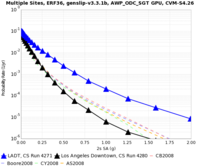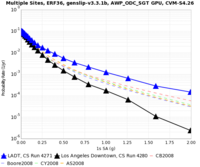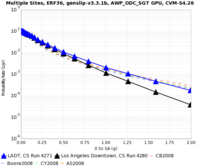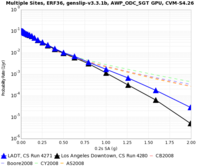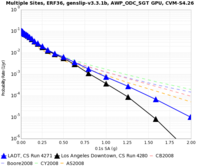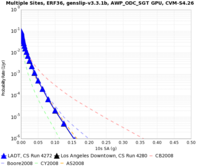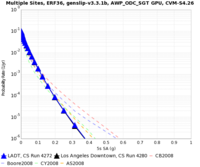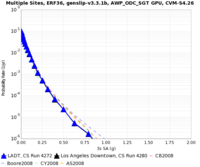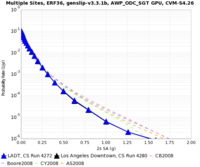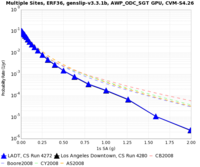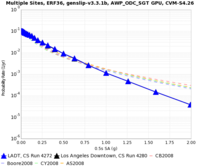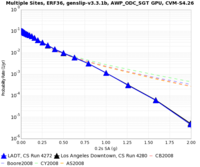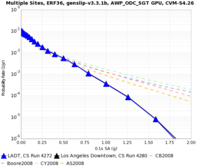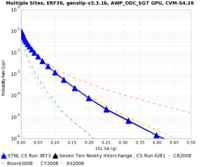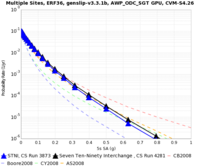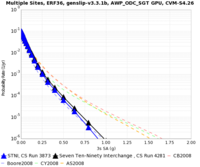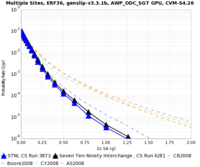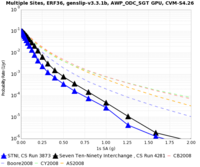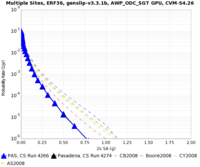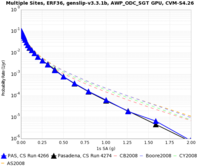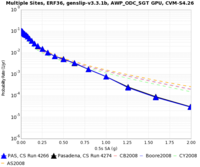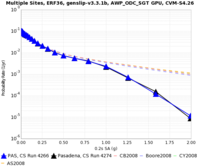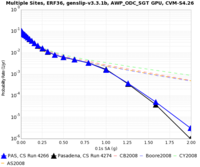Difference between revisions of "CyberShake Study 15.12"
m (moved CyberShake Study 15.10 to CyberShake Study 15.12: Study entered production on 12/3/15.) |
|||
| Line 1: | Line 1: | ||
| − | CyberShake Study 15. | + | CyberShake Study 15.12 takes the deterministic results from [[CyberShake Study 15.4]] and adds broadband components. |
| + | |||
| + | |||
| + | == Status == | ||
| + | |||
| + | Study 15.12 began production at 19:59:54 PST on December 3, 2015. Estimated completion is December 17, 2015. | ||
Revision as of 17:13, 4 December 2015
CyberShake Study 15.12 takes the deterministic results from CyberShake Study 15.4 and adds broadband components.
Contents
Status
Study 15.12 began production at 19:59:54 PST on December 3, 2015. Estimated completion is December 17, 2015.
Initial tests
We performed initial tests by using the Graves code from the current version of the BBP to synthesize stochastic seismograms, along with applying site amplification from CB2014. We used the Vs30 value taken from the same velocity model as the deterministic seismograms (CVM-S 4.26). We also applied site amplification from CB2014 to the deterministic seismograms. Then the deterministic seismograms were low-pass filtered at 1.0 Hz, and the stochastic seismograms were high-pass filtered at 1.0 Hz, and the results were combined. From this broadband seismogram we calculated PSA and RotD values.
| Run | 10 sec SA | 5 sec SA | 3 sec SA | 2 sec SA | 1 sec SA | 0.5 sec SA | 0.2 sec SA | 0.1 sec SA |
|---|---|---|---|---|---|---|---|---|
| PAS, broadband (run 4266) | ||||||||
| PAS, broadband (run 4266, blue) vs deterministic (run 3878, black) | ||||||||
| LADT, broadband (run 4271) | ||||||||
| LADT, broadband (run 4271, blue) vs deterministic (run 3870, black) |
Sample Seismogram
Below is a seismogram for PAS, source 273, rupture 69, rupture variation 50, comparing the 1 Hz seismogram (blue) to the 10 Hz seismogram (green). Mostly, the 10 Hz seismogram looks sharper.
Deterministic Site Amplification
We ran PAS and LADT with and without deterministic site amplification (using CB 2014, and Vs30 values from CVM-S4.26, "V1.0"). Here are the results:
| Run | 10 sec SA | 5 sec SA | 3 sec SA | 2 sec SA | 1 sec SA | 0.5 sec SA | 0.2 sec SA | 0.1 sec SA |
|---|---|---|---|---|---|---|---|---|
| PAS, site amplification (run 4266, blue) vs no deterministic site amplification (run 4270, black) | ||||||||
| LADT, site amplification (run 4271, blue) vs no deterministic site amplification (run 4272, black) |
Vs values v2.0
For the stochastic, we continued to use vref=865, and changed to Vs30 = 30 / Sum (1/(Vs sampled from [0.5,29.5] in 1 meter increments)).
For the deterministic, we switched to use vref = Vs @ Z=0 * Vs30 / Vs50 (50 is half the grid spacing of 100m).
For PAS, this means the LF vref went from 865 to 422.4, and the Vs30 went from 821.3 to 838.8.
For LADT, this means the LF vref went from 865 to 436.1, and the Vs30 went from 359.1 to 365.4.
Here are comparison curves for PAS and LADT.
| Run | 10 sec SA | 5 sec SA | 3 sec SA | 2 sec SA | 1 sec SA | 0.5 sec SA | 0.2 sec SA | 0.1 sec SA |
|---|---|---|---|---|---|---|---|---|
| PAS, previous site amp (run 4266, blue) vs new deterministic site amp (run 4275, black) | ||||||||
| LADT, previous site amp (run 4271, blue) vs new deterministic site amp (run 4276, black) |
Vs values v3.0
We modified the vref calculation further, to:
vref_LF_eff = Vs30 * [ VsD5H / Vs5H ]
with Vs30 determined from the CVM as before (averaging over 1 meter increments). The other parameters are determined based on the grid spacing used in the calculation, given by H:
Vs5H = travel time averaged Vs computed from CVM in 1 meter increments down to a depth of 5*H VsD5H = discrete travel time averaged Vs computed from 3D velocity mesh used in the SGT calculation over the upper 5 grid points
So, for H=100m Vs5H would be:
Vs500 = 500 / ( Sum ( 1 / Vs sampled from [0.5,499.5] in 1 meter increments ))
And then VsD5H is given by:
VsD500 = 5/{ 0.5/Vs(Z=0m) + 1/Vs(Z=100m) + 1/Vs(Z=200m) + 1/Vs(Z=300m) + 1/Vs(Z=400m) + 0.5/Vs(Z=500m) }
This gives vref = 705 for PAS, 361 for LADT, and 294 for STNI.
| Run | 10 sec SA | 5 sec SA | 3 sec SA | 2 sec SA | 1 sec SA | 0.5 sec SA | 0.2 sec SA | 0.1 sec SA |
|---|---|---|---|---|---|---|---|---|
| PAS, V1.0 site amp (run 4266, blue) vs V3.0 deterministic site amp (run 4279, black) | ||||||||
| PAS, no deterministic site amp (run 4270, blue) vs V3.0 deterministic site amp (run 4279, black) | ||||||||
| LADT, V1.0 site amp (run 4271, blue) vs V3.0 deterministic site amp (run 4280, black) | ||||||||
| LADT, no deterministic site amp (run 4272, blue) vs V3.0 deterministic site amp (run 4280, black) | ||||||||
| STNI, 1 Hz deterministic (run 3873, blue) vs V3.0 deterministic site amp (run 4281, black) |
srf2stoch_lite
To reduce the memory requirements of srf2stoch, Rob Graves created a new version, srf2stoch_lite, with much smaller memory requirements. The differences in hazard curves can be seen here, for PAS. Since srf2stoch is only used in the high frequency, we are only looking at high frequency curves. Blue is with srf2stoch, black is with srf2stoch_lite.
| 2 sec | 1 sec | 0.5 sec | 0.2 sec | 0.1 sec | |
|---|---|---|---|---|---|
| Curve | |||||
| Avg absolute % diff | 0.4% | 1.9% | 1.7% | 33.9% (skewed by 1 point; otherwise it's 1.8%) |
2.7% |
| Max % diff | 8.4%, at x=0.50g | 29.6%, at x=1.58g | 34.3%, at x=3.98g | 1448.7%, at x=2.51g | 68.4%, at x=2.00g |
